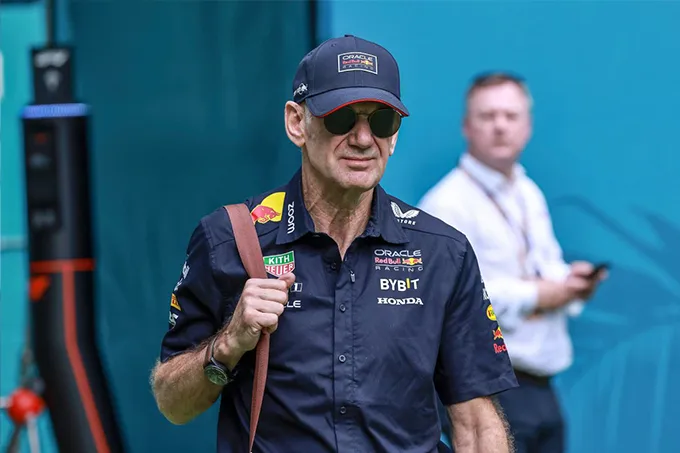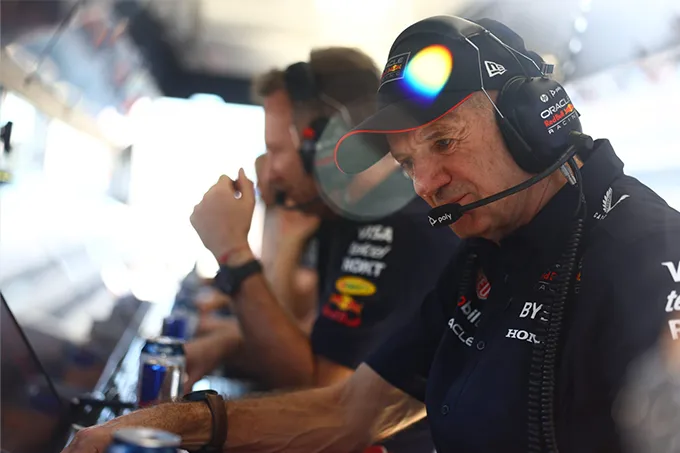Adrian Newey voices strong concerns over F1’s 2026 regulations and the EU’s push for fully electric vehicles.
His opinion is always highly anticipated: Adrian Newey, who will join Aston Martin in March 2025, has shared his thoughts on the upcoming F1 regulatory revolution.
This change, set to take place in 2026, will introduce a brand-new chassis and, more importantly, new engine regulations. Power will be split 50/50 between the internal combustion engine and electric energy.
“It’s a massive change,” confirmed Adrian Newey, on whom Aston Martin F1 is relying heavily to navigate this regulatory shift successfully.
“I can’t recall – perhaps it happened a long time ago – but I don’t remember the last time we had new regulations for both the power unit and the chassis.”
“The power unit regulations were set several years ago without really considering the accompanying chassis regulations. This has been a challenge for the FIA, with the support of the teams, ever since. How will this work? In truth, it’s still unclear.”
The primary aim of these new rules was to appeal to manufacturers, particularly to attract new players like Audi and Ford while retaining Honda.
On that front, the goal has been achieved, but with what side effects? Newey has raised concerns about the impact these changes will have on the on-track spectacle.
“The FIA’s original idea was to get 400 kilowatts from the power unit and 400 kilowatts from the hybrid side – the electric motor.”
“Then they realized that 400 kilowatts on the electric side was too much to sustain lap after lap, so they reduced it to 350. But even now, there are still significant concerns that the cars will be noticeably slower at the end of a straight than at the beginning because they’ll deplete their batteries.”
“This regulation was introduced, I believe, primarily to retain existing manufacturers and hopefully attract new ones. In that sense, you could say it has been successful. Audi is coming in. Honda reversed its decision to leave and is staying. But as for the spectacle, I think that’s a concern.”
So, what would Newey have done instead of the FOM and FIA?
“First of all, the most important thing for Formula 1 is the unique character of the cars,” he says.
“If the chassis regulations, which are mostly aerodynamic rules, become too restrictive, then all the cars end up looking the same.”
“What I’m saying is that prescribing aerodynamic performance is not necessarily the right path. I would have done the opposite.”
“If you look at other categories that have gone for a single, very restrictive chassis – IndyCar, which is perhaps the worst or best example – they went from a very successful series with many manufacturers up until the mid-90s to a single-manufacturer path with Dallara.”
Aston Martin F1’s prize recruit also raises a fundamental question about the future of Formula 1: is it essential to have manufacturers in the sport, even at the cost of the spectacle?
“Because, for me, the value lies in the teams, not the manufacturers. Manufacturers come and go. They change CEOs, who suddenly decide they’d rather sponsor a tennis tournament than Formula 1, and they go in a different direction. We’ve seen that happen regularly.”
Newey criticizes the EU’s ‘anti-engineer’ stance on electric vehicles
Newey’s sporting concerns align with broader doubts he holds about electric cars, which are being promoted by the EU.
“From a spectator’s perspective, I’m not sure they care all that much about whether the cars are more fuel-efficient, etc. The EU has done the same as governments: instead of saying, ‘This is a problem,’ which I completely agree with — we need to do something to help save the planet, improve ecology, etc.”
“They said: ‘Here’s what we want, and here’s what you’re going to do. You’re now going fully electric.'”
“Don’t get me wrong, I think electric certainly has its applications. It’s a great technology, and it’s clearly evolving rapidly.”
“But I disagree with the idea that it’s the prescribed technology and that’s all we can have, without allowing manufacturers to explore alternatives.”
“It’s very anti-engineer, and there’s no guarantee it will produce the right solution in every case — because it won’t.”
- You may also like>Kamala Harris Backs Lewis Hamilton in F1 Passion
- Also make sure you follow us on social media>Facebook and>Twitter

Newey Slams 2026 F1 Rules: Concerns Over Electric Shift Newey Slams 2026 F1 Rules: Concerns Over Electric Shift
